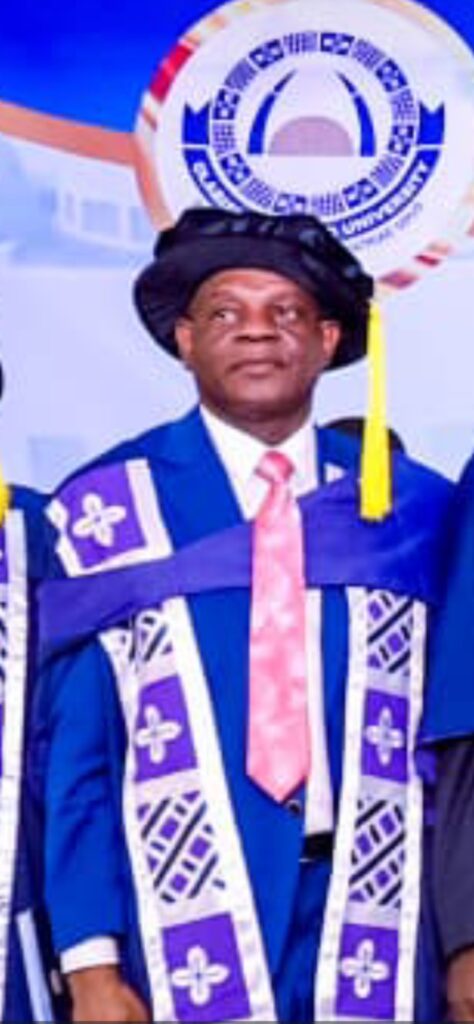… Warns Against 2030 Prediction On Skilled Workers’ Shortage
Daud Olatunji
The Executive Secretary of the Tertiary Education Trust Fund (TETFund), Dr. Sonny Echono has raised serious concerns over the grossly inadequate budgetary allocation to education in Nigeria.
Dr. Echono, also raised the alarm over the predicted global shortage of skilled workers by 2030.
Dr. Echono highlighted the urgent need for tertiary education institutions worldwide, including Nigeria, to adapt their curricula to meet the evolving demands of the global job market.
Delivering the 34th Convocation Lecture at Olabisi Onabanjo University, Echono stated that the current funding levels fall far short of meeting the nation’s educational needs, hindering the provision of a world-class tertiary education system.
He said “between 2016 and 2022, Nigeria’s total education budget allocation amounted to just N4.68 trillion, which constitutes a mere 5.94% of the total national budget.
According to him, this allocation falls significantly below the UNESCO-recommended benchmark of 15-20% of the national budget for education.
He added “in contrast, countries like Ghana and Kenya allocated a much higher proportion of their national budgets to education. Ghana dedicated 24.37% and Kenya 21.70% of their budgets to the sector, a far cry from Nigeria’s modest 7.9% in the 2024 fiscal year.
“These disparities further emphasize the urgent need for increased financial commitment to education in Nigeria to support the development of the country’s human capital and overall growth.
The TETFund boss emphasized that several studies forecast a significant gap in skilled labour, which could lead to major economic losses.
He stressed that addressing this challenge requires a renewed focus on aligning tertiary education with the skills employers seek, particularly in critical areas like problem-solving, creativity, innovation, and entrepreneurship.
Dr. Echono also pointed out that nations investing in tertiary education and research are likely to achieve better economic growth.
Citing a report by the Organization for Economic Co-operation and Development (OECD), he noted that a 1% increase in tertiary education attainment correlates with a 0.5% increase in GDP per capita.
Furthermore, Dr. Echono stressed the importance of higher education in driving human resource development.
With countries experiencing lower unemployment rates among individuals with tertiary education, he argued that higher education is a powerful tool for economic mobility.
Citing a World Bank report, he noted that in 2020, the global unemployment rate for individuals with tertiary education was just 5%, compared to 12% for those with secondary education alone.
While acknowledging the progress made in Nigeria’s tertiary education sector, Dr. Echono also highlighted the challenges that persist in ensuring equitable access.
He pointed out that only 20% of the population in many developing countries have access to tertiary education, a stark contrast to over 70% in developed nations.
Speaking on the history of TETFund, Echono said it was established by the TETFund Act of 2011, adding that it plays a crucial role in addressing these funding gaps.
He said “as an interventionist agency of the federal government, it has been responsible for providing critical funding and infrastructural support to public tertiary institutions, including universities, polytechnics, and colleges of education.
“Over the years, TETFund has managed to strategically position these institutions for global competitiveness by facilitating effective teaching, research, and innovation through the disbursement of the Education Tax, a 2% (now 3%) tax paid by all registered companies in Nigeria.”
The Executive Secretary stressed that for Nigeria to achieve global standards in tertiary education, sustained investment is required over a long period.
He s tressed that the investment, must focus not only on infrastructure but also on improving academic content and research capabilities.
tressed that the investment, must focus not only on infrastructure but also on improving academic content and research capabilities.
He however lamented that despite the notable successes of TETFund in driving improvements in the sector, the education system continues to face significant challenges, such as outdated infrastructure and a shortage of learning resources.
He emphasized that addressing these structural issues—such as funding disparities and inadequate infrastructure—is essential for maximizing the potential of tertiary education in driving national development.
Dr. Echono called for continued investments in Nigeria’s educational system, particularly in preparing the nation’s youth for the demands of the 21st-century workforce.
He expressed optimism that Nigeria’s growing young population could provide the global workforce of the future, provided the right investments are made in their education.
Do you want to share a story with us? Do you want to advertise with us? Do you need publicity for a product, service, or event? Contact us on WhatsApp +2348183319097 Email: platformtimes@gmail.com
We are committed to impactful investigative journalism for human interest and social justice. Your donation will help us tell more stories. Kindly donate any amount HERE


